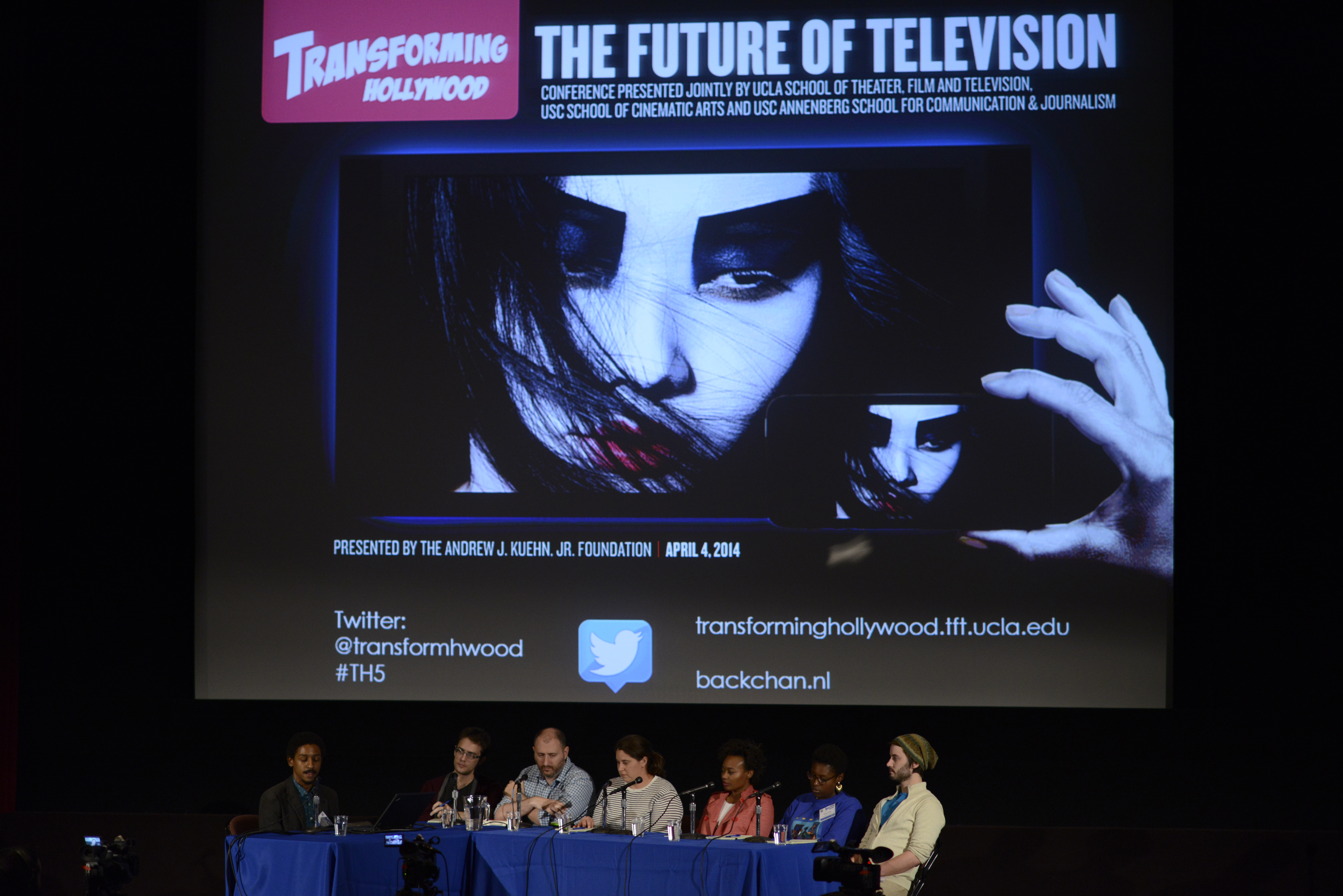‘Transforming Hollywood’ explores changes in TV industry

Courtesy of UCLA School of Theater, Film and Television
The UCLA School of Theater, Film and Television, USC Annenberg School for Communication & Journalism and USC School of Cinematic Arts put aside their rivalryon Fridayto present the fifth annual Transforming Hollywood conference, held in the James Bridges Theater from 9 a.m. to 6 p.m.
With representatives from companies such as Amazon, Hulu, Netflix and YouTube present, the conference explored the major changes taking place in the television industry. The day’s most notable topics included the development of online streaming, Kickstarter, indie television and fandom.
In the first panel, “Virtual Entrepreneurs: Creators Who are Reinventing TV for the Digital Future,” Sheri Bryant (co-founder of Geek and Sundry), Allen DeBevoise (CEO of Machinima, Inc.), Amanda Lotz (associate professor of Communication Studies at the University of Michigan) and Larry Shapiro (head of talent at Fullscreen, Inc.) explored the viability of new business models in which corporations sponsor popular YouTube creators to enhance the production value of their work. The panel was moderated by Denise Mann, co-director of the event and associate professor at UCLA’s School of Theater, Film and Television.
Bryant noted the diversity of content and niche channels that online multi-channel networks offer, while DeBevoise highlighted the grassroots nature of these companies as fans become creators of their own channels.
“It is a completely different ball game,” DeBevoise said. “And quite frankly one of the big things about fans is this notion that any person can go onto YouTube, watch a channel and reach a global audience. That was impossible in television. You had all these gatekeepers that prevented you.”
In tandem with the previous conversation about online programming, the second panel, titled “The Programmers of the Future in an Era of Cord-Cutter and Cord-Never” invited television network Pivot’s Senior Vice President of Alternative and Live Programming Belisa Balaban, YouTube’s Director of Content Strategy Jamie Byrne, Producer of Media Nation David Craig and Amazon Studios’ Head of Original Comedy Programming Joe Lewis to share their expertise in the growing field of alternative online television. Andrew Wallenstein, editor in chief of Variety, moderated the panel.
After each panelist discussed his or her involvement in the industry, Lewis commented on the change in format that streaming sites have introduced and their increasing popularity among viewers.
“It’s something that we’re figuring out. That’s sort of one of the exciting things about what we’re doing. Television has been done a certain way for a long time,” Lewis said. “(Now) you can binge shows. It allows you to get deeper into the characters and deeper into stories.”
Byrne added that the change in format has changed the way viewers interact with content. Balaban agreed, citing Joseph Gordon-Levitt’s “HitRECord on TV” on Pivot, which encourages viewers to submit their work to be featured in the show. In this way, Balaban said, online programming showcases a limitless range of points of view by funneling them through a single curator.
With the steady rise of viewership on mobile devices and tablets, programmers and distributors will continue to evolve by adapting to the developing technologies.
As the previous panel centered on the rise of online-streaming sites and content providers, the third panel made a smooth transition to focusing on how the involvement of social media and fan investment influences the way in which television is consumed.
“Second Screens, Connected Viewing, Crowd-funding and Social Media: Reimagining Television Consumption,” invited lead strategist for the “Veronica Mars” Kickstarter campaign Ivan Askwith, Chief Marketing Officer of BET Networks Vicky Free, Senior Vice President of Television Bureau of Advertising Stacey Lynn Schulman and Director of Telecommunications and Information Policy Institute at University of Texas at Austin Sharon Strover.
The panel quickly propelled into a discussion about fans’ and audiences’ unclear understanding of their role in television consumption and their sense of false ownership of the projects they finance through Kickstarter.
“Fans already feel like they own everything,” said Askwith. “We didn’t want them to feel ownership (because) the creative process doesn’t necessarily benefit from the audience feeling ownership.”
Regardless of the lack of ownership of content, fans continue to drive the popularity of indie television, which was the main topic of discussion in the fourth panel of the conference. The panel, appropriately titled “Indie TV: Where Creators and Fans Pilot New Shows,” showcased how platforms such as Vimeo and YouTube allow creators to release content to viewers directly.
The panel featured executive producer, co-creator and star of the show “Husbands” Brad Bell, producer and writer of YouTube’s “The Lizzie Bennet Diaries” Jay Bushman, writer and director of web series “Whatever this is.” Adam Goldman and others.
Despite the drastic difference in content of each web series presented, many of the panelists emphasized the significance of underrepresentation of particular groups in mainstream television.
Goldman said, “One of the great things about doing indie TV and doing this sort of thing online is that communities that are underrepresented get to have a voice that we don’t necessarily get to have when board rooms don’t think that it would be lucrative.”
Solo panelist Orlando Jones concluded the conference by addressing the notion of fandom and the drastic changes that social media is bringing to the relationships between creators and audiences in “Fandom and the Future.”
Jones, known for his current role as Captain Frank Irving on Fox’s “Sleepy Hollow,” embodies the existing relationship that has developed between stars and fans in the era of engagement-based television. Jones maintains an active relationship with his fan base through his engaging use of social media.
“My approach to fan engagement is born from a genuine appreciation for the evolving and essential relationship between fans and creators,” Jones said. “The fact that I’m involved in a creative enterprise that stimulates the creativity of others and inspires them to create transformative works of their own … is one of the most rewarding aspects of what I do.”


